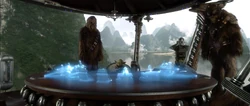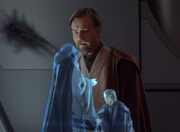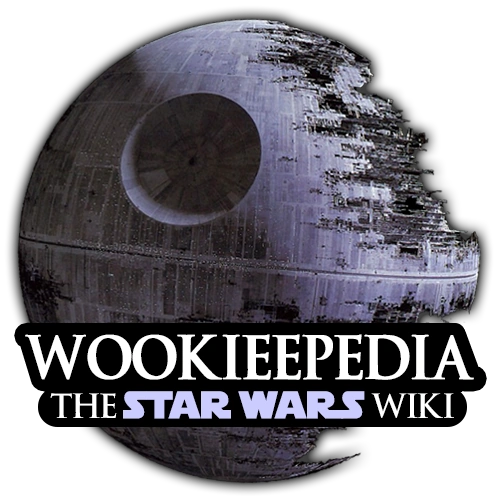| | |
Warning: This infobox has missing parameters: inscription, destroyed, creators, modifier, value, discovered, structure, markings, created, locations, capacity, protection, heritage, width, manufacturer, owners, purpose, height, culture, material, length and unrecognized parameters: hidet, era, manufacture
- "Help me, Obi-Wan Kenobi, you're my only hope *static* Help me, Obi-Wan Kenobi, you're my only hope."
- ―Leia Organa's message to Obi-Wan Kenobi
A hologram was a moving three-dimensional representation of a person or object, normally used in communication or entertainment.
Operation

Yoda participates in a holographic Jedi Council meeting
- "Commander Cody, the time has come. Execute Order 66."
- ―Commander Cody receiving a hologram from Darth Sidious
Holograms were used mostly in telecommunications as an alternative to screens. A holocamera of any recorder or receiver would acquire the dimensions, form and movements of an object by means of ray scanning. This vision then could be transmitted simultaneously somewhere else, or stored and reproduced on a holoprojector at a later time. Projected holographic images were visible from all sides, although matterless. Holograms were initially monochrome with a cyan hue, though following the Clone Wars, an additional layer of color was added to some holograms. In full duplex telecommunications, users could see each other's holograms, as if they were in the same room talking to each other, although not always in relative proportion.
Standard holograms had a lesser quality than screens, since they were mainly monochrome and often flickered. The luxury versions could produce incredibly life-like full-color images, and were mainly used for entertainment purposes, such as at the Holographic Zoo of Extinct Animals, or Hologram Fun World, though they could also be used for disguises and other deceptions.
Uses

Obi-Wan Kenobi watching a security hologram of Darth Vader kneeling before Darth Sidious
- "I can't watch any more."
- ―Obi-Wan Kenobi upon seeing a hologram of Darth Vader slaughtering Jedi
Portable holovids could display a miniature hologram. Projectors were also implemented in many starship communication systems, both for use by pilots and passengers. Some droids could also record and display holograms (eg. R2-D2).
Members of the Jedi Council could attend Council meetings via hologram if absent from Coruscant or otherwise unable to be there physically. Their image would project on their formal seat and they would participate as if they were present.

Briefing hologram of Endor and the Death Star II before the Battle of Endor
Holograms were also frequently used in scientific projects as schematics. Likewise, they could be used in military operations and briefings. During the Battle of Naboo, R2-D2 projected a hologram of the Theed Royal Palace before organizing the assault. Prior to the Battle of Endor, a hologram of Death Star II illustrated the attack plan to the Rebellion pilots.
Holograms were also used in targeting practice. For instance, the Republic clone army used holograms of B1 battle droids and B2 super battle droids, as well as holograms of Anakin Skywalker and Obi-Wan Kenobi, to train their clone sharpshooters and improve their ability to distinguish between hostile and friendly targets.[1]
Someone who forged holograms and passed them off as the real thing was known as a holo faker.[2]
Storage of holograms
Holograms could be transmitted directly, or they could be stored in various storage devices (such as holodiscs)[3][4] and in astromech units or other types of droids. The storage device would be hooked up with a holoprojector in order for the stored image to be accessed. Many droids had built-in holoprojectors.
Hologram storage devices could be encrypted in case their contents were deemed sensitive or classified. Morgan Katarn recorded and encrypted a hologram for his son revealing his Jedi heritage. The hologram was stored on a holodisc and could only be accessed by the Katarn family droid WeeGee. However, Jan Ors and Xiong Wong (with the help of Wires) managed to partially crack the hologram and display it, albeit in a very bad quality, to Mon Mothma, Leia Organa and Luke Skywalker.[4]
Appearances
Non-canon appearances
- LEGO Star Wars: The Phantom Menace
- LEGO Star Wars: The Video Game
- LEGO Star Wars: The Complete Saga
- LEGO Star Wars: The Quest for R2-D2 game
- LEGO Star Wars: The Quest for R2-D2 film
- LEGO Star Wars: The Padawan Menace
- LEGO Star Wars II: The Original Trilogy
Sources
- The Secrets of Star Wars: Shadows of the Empire
 1996 Topps Star Wars: Shadows of the Empire (Card: Vader Uncovers Xizor's Secret Past) (backup link (http://www.rebelscum.com/photo.asp?image=/sote/soteTC0056.jpg) not verified!)
1996 Topps Star Wars: Shadows of the Empire (Card: Vader Uncovers Xizor's Secret Past) (backup link (http://www.rebelscum.com/photo.asp?image=/sote/soteTC0056.jpg) not verified!) Star Wars: Shadows of the Empire Embossed Metal Collector Cards (Card: ISSUE 1: Xizor's Plan Revealed) (backup link (http://www.rebelscum.com/photo.asp?image=/sote/soteMIcards1bk.jpg) not verified!) (Picture only)
Star Wars: Shadows of the Empire Embossed Metal Collector Cards (Card: ISSUE 1: Xizor's Plan Revealed) (backup link (http://www.rebelscum.com/photo.asp?image=/sote/soteMIcards1bk.jpg) not verified!) (Picture only)- Star Wars: The Art of the Brothers Hildebrandt
- Star Wars Encyclopedia
- Star Wars: Episode I toy line
- Galaxy Guide 3: The Empire Strikes Back
 Star Wars Customizable Card Game — [[Unknown set: No set defined!]]
Star Wars Customizable Card Game — [[Unknown set: No set defined!]]- Wretched Hives of Scum & Villainy
- Star Wars Episode I: The Phantom Menace (reference book)
- The New Essential Guide to Weapons and Technology
 "Hapes: Ladies First" (original article link) on Wizards.com (content now obsolete; backup link)
"Hapes: Ladies First" (original article link) on Wizards.com (content now obsolete; backup link) "Aargau: For All Your Banking Needs" (original article link) on Wizards.com (content now obsolete; backup link)
"Aargau: For All Your Banking Needs" (original article link) on Wizards.com (content now obsolete; backup link)- Knights of the Old Republic II: The Sith Lords: Prima Official Game Guide
- The Complete Star Wars Encyclopedia
 Star Wars Galaxies Trading Card Game — [[{{{set}}}]] (Card: Death Star Hologram) (backup link)
Star Wars Galaxies Trading Card Game — [[{{{set}}}]] (Card: Death Star Hologram) (backup link) Star Wars Galaxies Trading Card Game — [[{{{set}}}]] (Card: Corellian Corvette Hologram) (backup link)
Star Wars Galaxies Trading Card Game — [[{{{set}}}]] (Card: Corellian Corvette Hologram) (backup link)- The Unknown Regions
- Millennium Falcon Owner's Workshop Manual
- Star Wars: The Ultimate Visual Guide: Updated and Expanded
- Star Wars: Obi-Wan Kenobi, Jedi Knight (Picture only)
- Star Wars: The Clone Wars: Masters of the Force
- Star Wars: The Legendary Yoda
- Star Wars: Edge of the Empire Core Rulebook
- Star Wars: Force Collection (Card: Luke Skywalker (★★)) (Indirect mention only)
- Star Wars: Force Collection (Card: Master Yoda (★★★)) (Picture only)
- Star Wars: Force Collection (Card: Nute Gunray (★★★)) (Picture only)
- Star Wars: Force Collection (Card: Poggle the Lesser (★★★)) (Picture only)
- Star Wars: Force Collection (Card: Wat Tambor (★★★)) (Picture only)
- Suns of Fortune

